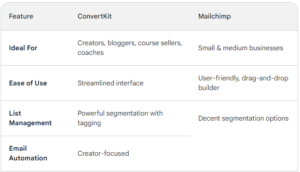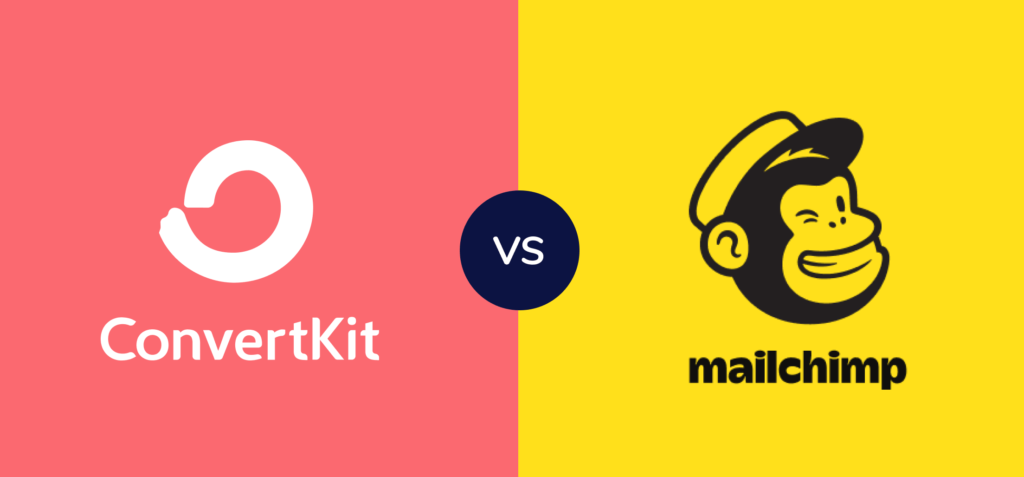In today’s digital landscape, email marketing remains a powerful tool for nurturing leads, driving sales, and fostering customer loyalty. But with a plethora of email marketing platforms available, selecting the right one can feel overwhelming. Two industry titans, ConvertKit vs Mailchimp, often top the contenders’ list.
This article delves into the strengths and weaknesses of both platforms, equipping you to make an informed decision based on your specific business needs.
Understanding Your Business Needs
Before diving into the feature sets, take a step back and identify your business goals. Are you a solopreneur or a small business with a growing email list? Do you prioritize creator-specific features or advanced marketing automation?
Here’s a breakdown of how ConvertKit and Mailchimp cater to different business types:
- ConvertKit: Ideal for creators, bloggers, course sellers, and coaches who value targeted marketing and subscriber segmentation.
- Mailchimp: A versatile platform that caters to small and medium-sized businesses (SMBs) with diverse marketing needs, including e-commerce integrations and marketing automation workflows.
Feature Smackdown: ConvertKit vs Mailchimp
Let’s explore some key features that differentiate ConvertKit and Mailchimp:
Ease of Use: Both platforms offer user-friendly interfaces. Mailchimp boasts a slight edge for beginners due to its drag-and-drop email builder and pre-built templates.However, ConvertKit’s interface is streamlined and focuses on core email marketing functionalities.
Email Marketing Features:
- List Management: ConvertKit excels in subscriber segmentation with tagging and custom forms, allowing for highly targeted email campaigns. Mailchimp offers decent segmentation options but can feel cumbersome for complex needs.
- Email Automation: Both platforms provide automation features, but ConvertKit’s are more creator-focused, including automated welcome sequences and tagging based on subscriber behavior. Mailchimp offers a wider range of automation workflows for complex marketing campaigns.
- Landing Pages and Forms: Mailchimp offers built-in landing page creation and a wider variety of form templates. ConvertKit integrates with popular landing page builders but offers fewer built-in forms.
- Reporting and Analytics: Mailchimp shines in this area, providing detailed reports on campaign performance, subscriber engagement, and A/B testing results.ConvertKit’s reporting is more basic, focusing on open rates, click-through rates, and deliverability.
Pricing:
ConvertKit: Offers a free plan for up to 1,000 subscribers, then scales based on subscriber count.
Mailchimp: Provides a free plan for up to 2,500 subscribers with limited features.Paid plans offer additional features and higher subscriber limits.
Choosing the Right Platform: A Summary
ConvertKit:
-
- Ideal for: Creators, bloggers, course sellers, and coaches who prioritize subscriber segmentation, targeted campaigns, and affordability (especially for smaller lists).
- Pros: Streamlined interface, powerful segmentation tools, strong automation for creators.
- Cons: Limited landing page and form creation, basic reporting features.
Mailchimp:
-
-
- Ideal for: Small and medium-sized businesses with diverse marketing needs, including e-commerce integrations, marketing automation workflows, and detailed campaign reports.
- Pros: User-friendly interface, drag-and-drop email builder, diverse templates, advanced automation capabilities, robust reporting.
- Cons: Can feel complex for simple needs, free plan limitations, potentially higher pricing for larger lists.
-

The Final Verdict
There’s no one-size-fits-all answer. The best platform hinges on your specific business goals and email marketing needs.
Here’s a quick tip: If you’re a creator or solopreneur starting out, ConvertKit’s streamlined approach and affordability might be a good fit. As your business scales, Mailchimp’s robust feature set can cater to your evolving marketing needs.
Ultimately, both ConvertKit and Mailchimp offer free plans, so take advantage of them to test-drive each platform before committing.
By carefully considering your requirements and exploring the features offered by both ConvertKit and Mailchimp, you’ll be well-equipped to select the email marketing platform that empowers you to connect with your audience and achieve your marketing goals.


